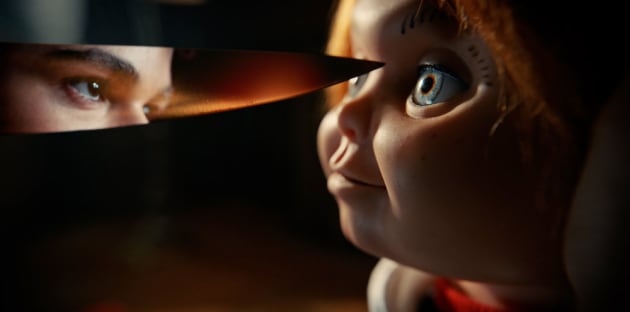As Asian American Pacific Islander Month comes to end, it’s important to remind ourselves that the Asian American identity is more than just race or shared affinity. Born out of political activism and the anti-war movement to protest and rally against injustice, warfare, imperialism, and colonization, it’s a call for unity, for liberation, and for solidarity. After all, none of us are free until we are all free.
These 12 stories by Asian American writers below are a small selection of the works of fiction published in our weekly literary magazines, Recommended Reading and The Commuter. They range in form, subject, and location, but they all represent the very best of storytelling.
“My Worst Experiences Haunt Me From the Memory Cloud” by Gina Chung
“Presence,” from Korean American writer Gina Chung’s story collection Green Frog, embroiders a gritty emotional reality with elements of the fantastical to tell the story of Amy Hwang, a preternaturally talented scientist who has fallen from grace and is suffering the demons of her own innovation. A technology she helped build that allows people to organize and manage their memories like the desktop of their computers had more extreme and adverse side effects than Amy, who was in a toxic relationship with the company’s founder, let on. The story picks up with Amy hiding out in her apartment, avoiding the world along with her own guilts and painful childhood memories–they’ve all been deleted from her mind and uploaded onto a computer. But what she cannot escape is the very real presence that has shadowed her and pulled at the edge of her consciousness ever since her memories went away. “Sometimes, it tugged at my attention like a recalcitrant dog at its leash, distracted me, made my head throb.” On a friends recommendation, Amy drives to a remote spa where she can reset and begin to connect with the parts of her life that she has been avoiding.
“The Ugliest Babies in the World” by Vanessa Chan
Written in Malaysian English, the titular story from Vanessa Chan’s forthcoming collection, The Ugliest Babies in the World, captures a microcosm of the tangled, loving relationships between children and their elders. Ah San visits her grandmother at her home in hospice care each afternoon, consciously replaying their favorite moments together. Surrounded by the detritus of her childhood in the sweltering house, she listens to her grandmother’s legends about how she and cousins were born–tales Ah San knows by heart. Each baby is uglier than the next, born jaundiced, one-eyed, blue, and onwards into delirious exaggeration. “My grandma says Ah Leng was so hideous when she was born that her mother screamed ‘I want a new baby!’” As disfigurements mount, it’s love, not beauty or the lack thereof, that shines through the grandmother’s stories.
“The Body is Not a Natural Home” by Chaya Bhuvaneswar
In “Jagatishwaran,” the trapped and isolated titular character aims to find his place in his body, his family, and his life in India. Jagat struggled with tuberculosis and still struggles with an unnamed mental illness. As a result, he is unemployed, much to his father’s disappointment. Behind four wood screens, Jagat shelters himself from the outside world to escape into his own world. He passes time painting murals, smoking tobacco, writing in his diary, listening to the radio, and reading newspapers, all in secret. While his mother rarely speaks with him anymore and his father frequently expresses his disappointment and disapproval, Jagat’s niece and sister continue to reach out to him. He longs for the opportunities and freedom that the women in his family enjoy. Still, he finds peace in solitude, and by observing the exterior world, he finds beauty in outside life and searches for his own beauty, similar to the beauty in his paintings.
“A Doomed Romance is the Deadliest Tragedy” by S.J. Sindu
From Sri Lankan American writer S.J. Sindu’s collection The Goth House Experiment, “Patriots’ Day” begins and ends with tragedy. Set in the Boston area on April 15, 2013, the Boston Marathon bombing serves as a backdrop to the narrative—but “Patriot’s Day” primarily focuses on smaller-scale events. The reader learns from the start that Pamela Robinson will push Amit Srinivasan in front of a train, ending his life. Then, the story follows Amit throughout his day, as he thinks about the divorce he initiated and the girlfriend he prioritized, Hannah. The story also follows Pamela, Hannah’s mother, illustrated as an everyday woman struggling to maintain a positive relationship with her daughter. In many ways, they lead similar lives: They spend their day at mundane jobs, they want to move to bigger homes, and they both find comfort in Boston’s trains. Neither of them are perfect. Amit cheated on his wife with Hannah, and Pamela doles out casually-mentioned racism, unsure if she can “carry around pictures of mixed grandchildren in her purse.” When they meet, they clash, largely over their ties with Hannah. “Patriot’s Day” reminds the reader that all people are human: carrying deep flaws, navigating various struggles, trying to maintain family relationships, holding various needs and wants that seem out of reach, starkly similar, starkly different, and all villains in someone else’s story.
“Teaching My Son to Swim While I Drown” by Megan Kamalei Kakimoto
“Madwomen,” by Hawaiian author Megan Kamalei Kakimoto, is from her collection Every Drop is a Man’s Nightmare. A single mother to an almost seven-year-old son tells the story of the Madwoman of the Sea, who has twelve eyes, a barbed tail, and a taste for men and young boys who don’t listen to their mothers. This story tells of the complexities of motherhood, the feelings of failure, the coexistence of love and resentment—where frustration and fear collide with the desire to protect, to teach, and to understand. As a Hawaiian mother to a son who is half-white and resembles his absent father, she does not want to lose him to whiteness and to a masculinity founded in violence. The mother takes her son to the ocean to teach him to swim, and when he succumbs to his fear, she says “I feel the bruises bloom along my neck without witnessing the injury firsthand, which is the best way I can describe being a mother.” The mother relates to the Madwoman, the rage, the ways she instills fear in the men and boys, and the want for reclamation of power and autonomy.
“Mom Is in Love with Randy Travis” by Souvankham Thammavongsa
In “Randy Travis,” a short story by Laotian Canadian writer Souvankham Thammavongsa, from her collection How To Pronounce Knife, the narrator tells of their mother’s obsession with country music star Randy Travis. Their mother’s love of American country music came with the radio that was gifted to them from the refugee settlement program, and then when the narrator’s father got his first paycheck, he bought a record player. The narrator’s mother watched country music award shows and recorded Randy Travis’ music videos in order to watch and rewatch them whenever she wanted. Their mother begins sending letters to Randy Travis, but because she can’t write in English, she has the narrator—seven-years-old at the time—write the messages. Because the narrator is afraid of what might become of their father if Randy Travis responds, they write messages like you’re ugly and I do not like you. There is humor in this piece, but it is also fitting into larger conversations of addiction and obsession, of the representations of emotionality and masculinity in music, of language and language barriers, of home, of culture, of family, of what we do for those we love, and of what we sacrifice. The narrator’s father begins to dress like Randy Travis to appease his wife, and takes her to see Randy Travis in concert because these are the things she wants, and, as the narrator says, “he was only trying to be what [their] mother wanted.” This story is heartbreaking in that those efforts of compromise, those sacrifices, are not reciprocated. It is a mourning of Laos, as well as the loss of a mother and a wife to her perception of the Western ideal.
“An Obsessive Unpacks a Bewildering Insult” by Eric Ozawa
This experimental story, told, as promised, in thirteen sections, is called “Fish (in 13 sections),” written by Eric Ozawa. In it, a man is called fish as his lover leaves him, and this story is a close-read as to why a fish. Somewhere between a critical analysis and the scientific method, our narrator interrogates the different possible meanings of you fish, including it being from a literary quote, of it being meant as verb, as it being said to reflect the absurdity of their relationship, or, if he had simply misheard her on her way out. For each possible meaning, he proposes an answer, a reason, and a remedy, from writing a country song to plotting her murder (under the guise of having watched The Godfather, of course). This story is odd, and it reflects the strangeness of a break-up, of insults hurled during times of high emotion. This story is funny, unique in both structure and style, and it understands the absurd ways that the confused human brain thinks.
“The Rise and Fall of the Luxury Baby Farm” by Mai Nardone
In “Ourselves, A Little Better,” Thai American writer Mai Nardone questions the ethics of the genetic modification of the human embryo. Dr. Susan Sims, a reserved scientist, develops a new, efficient, and highly successful way to treat infertility that includes an extremely specific and selective donor process and ethically controversial experimentation on genes in what is coined the Build-A-Baby process. Dr. Sims set out “to perfect the human race,” and claims that “what was important was improvement, each generation producing a better specimen than the last.” She is charged with violating the Nuremberg Standards, after an undercover journalist enrolls in Dr. Sims’ program for surrogate mothers, who are treated more as prisoners being experimented on, held in chambers that emulate the panopticon. This story is a fascinating look into the horrors of eugenics, and how these experiments on human embryos are logicized as having a pragmatic and beneficial impact on the future of the human race.
“Never Marry a Man with a Human Mother” by K-Ming Chang
“Xifù,” a short story from Taiwanese American writer K-Ming Chang’s collection Gods of Want, is a funny, biting story about a woman’s strained relationship with her mother-in-law. With rousing wit and daring candor, she recounts her mother-in-law’s six failed suicide attempts, which she describes as times she “pretended to die,” from trying to hang herself without lifting her feet from the ground to sticking her head in the oven without turning it on. Chang’s voice carries the story: She speaks to the reader like a friend, and her storytelling—rich with clever, shocking, hilarious similes—is riveting and authentically raw. Despite the story’s blunt attitude, Chang writes with brilliant emotional depth that unlocks unconventional insight into womanhood, motherhood, and complicated family dynamics. Honest pain, struggle, and conflicted feelings about her mother-in-law permeate her sharp remarks about her experience as a woman and wife.
“Navigating New Orleans in Vietnamese” by Eric Nguyen
Excerpted from Nguyen’s prize winning debut novel Things We Lost to the Water, this standalone piece follows a Vietnamese mother and her two sons who, having escaped from the communist regime to an anonymous refugee camp, are now freshly arrived in New Orleans. Hương longs to reconnect with the husband she left behind in Vietnam while trying to begin a new life for her two sons and keep a fragile peace with the dysfunctional Vietnamese-American family they’re forced to live with. Fruitless days are spent seeking work and being rejected. “‘No,’ she said again, this time more forceful, like the word was a pebble and she was flicking it toward what must have been a strange Vietnamese woman.” Through Hương’s eyes, America is an indecipherable world, full of secrets, hidden clues, and violence.
“The City Can’t Replace Her Best Friend” by Ada Zhang
In Ada Zhang’s “Julia,” from her collection The Sorrows of Others, Esther, who had “moved so many times in New York, across different boroughs, that the effect of leaving had all but worn off,” relives a failed college friendship with the titular character, her idol, while tracing her history in the city she’s about to leave. Passing old apartments and favored smoothie shops, Esther struggles to separate herself, even eight years since their last conversation, from Julia’s influence–she can’t shake the feeling that whenever she impresses or intimidates other women, it’s Julia they see in her, “Julia they [respect and fear].” As an anatomy of the long ago friendship develops—from its inception over a long college summer through the friends they mutually alienated and arrogances they indulged in—hidden imbalances, dependencies, and manipulations appear. Esther’s memory of the relationship becomes its own act of pulling up roots, moving, and starting life anew.

“Even the Smartest Phone Can’t Find Water in a Desert” by Jessie Ren Marshall
This work of flash fiction is written as a series of Siri-like responses and internet search results. We never hear directly from the man, but from his increasingly desperate queries to his phone, we learn that he’s stuck in the California desert because his car is out of gas and he’s very thirsty. His smartphone, dangerously low on battery, is his only hope, but things aren’t going too well:
“The temperature in this location is 116 degrees Fahrenheit, and your body temperature is 104 degrees Fahrenheit. Tonight it will be clear and dry. Tomorrow it will be clear and dry. It will be clear and dry all week in the Central Valley.
Okay. I found 512,000,000 results for ‘HOW DO YOU GET A CAR WITH NO GAS TO START.’ Should I read the first result?
…WARNING: LOW BATTERY.”





































































